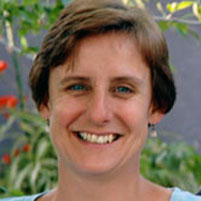First Dietrich College Dean’s Innovation Scholar Announced
By Shilo Rea

Mara Harrell, associate teaching professor of philosophy at Carnegie Mellon University, has been named the first Dietrich College of Humanities and Social Sciences Dean’s Innovation Scholar. The three-year, $45,000 award was established to recognize a teaching track faculty member who is doing high-quality and innovative educational research with high potential impact.
“CMU has two missions: research and education,” said Richard Scheines, dean of the Dietrich College. “Tenure track professors are focused on research, and are expected to be good at the educational mission as well. Teaching track professors are focused on the educational mission of the university, but expected to be good at the research mission as well. Focusing on the educational mission requires in some instances more focus on teaching students, and in others more focus on research on how to teach.”
Scheines continued, “We have several awards for great teaching, but heretofore no award for great research on teaching. I created this award to recognize the ground-breaking research on pedagogy, disciplinary education or technology enhanced learning that is already taking place in Dietrich College, and to encourage more of it.”
Harrell joined the Department of Philosophy in 2003 and teaches courses on topics ranging from environmental ethics and the philosophy of physics to science fiction and philosophy and empiricism and rationalism. Her research focuses on teaching students to analyze and construct arguments – a cornerstone of a college education but that has received far too little systematic study. She has been a pioneer in the use of argument diagrams and online environments to help students learn argument analysis through argument diagrams. Her research is known throughout the world, and she recently authored an introductory philosophy textbook based on this research – “What Is the Argument? An Introduction to the Practice of Philosophy,” which is under contract with MIT Press.
Beginning in her own classes and expanding to the Philosophy Department’s introductory level courses and to CMU’s campus-wide First-Year Writing Program, Harrell has used her educational research to refine and improve how students are taught. In line with the university-wide Simon Initiative, Harrell uses data to continuously and measurably improve student-learning outcomes. For example, she found that using argument diagramming in her introductory-level courses to teach students how to analyze and create arguments helped students develop stronger reading and argument skills than students who did not learn them.
To effectively and easily incorporate the diagramming in her courses and so that they could also be used by other faculty members, Harrell worked with Human-Computer Interaction (HCII) and Program in Interdisciplinary Education Research (PIER) graduate student, Matt Easterday, to create argument-diagramming software, called iLogos. With the help of Easterday, and Lexi Drozd, a graduate student in the Philosophy Department, she also developed an introductory argument diagramming mini-course using CMU’s Online Learning Initiative (OLI) platform and integrated into it the argument diagramming software. Now, many of the department’s lower level courses use at least some elements of the interactive course.
Harrell also teamed up with Danielle Wetzel, teaching professor of English and director of the First-Year Writing Program, to improve the Carnegie Mellon writing course that all students, from all schools and colleges, must take. Harrell and Wetzel designed a study in which some sections of the writing course were taught as usual and some were taught using Harrell’s argument diagramming curriculum. The results showed that the students who learned argument diagramming improved their writing the most over the semester. Now, most offerings of the writing course include Harrell’s argument diagramming curriculum.
Harrell and Drozd also developed four different OLI courses for the program: a full-length and shortened version; one that excludes diagramming exercises and one that is just text. They randomly assigned each version to different sections of the required writing course, and are in the process of analyzing the data in order to determine what components of the online course are most effective.
Harrell plans to use the Dietrich Innovation Scholar grant to hire graduate or undergraduate students to help do data analysis and develop further studies. She also hopes to travel to educational conferences to share her teaching research methods with other education professionals.
“In my view, the academy needs to do more to encourage its faculty to innovate not just in research, but also in how we teach and help students learn,” Scheines said. “With the Simon Initiative, CMU has embraced the role that learning science can and should play in transforming education. With this award, I hope to recognize the crucial role that our excellent teaching track faculty will play in making this all happen in Dietrich College.”
CMU’s Simon Initiative, named for the late Nobel and Turing laureate Herbert Simon, aims to measurably improve student learning outcomes by harnessing a learning engineering ecosystem that has developed over several decades at CMU.